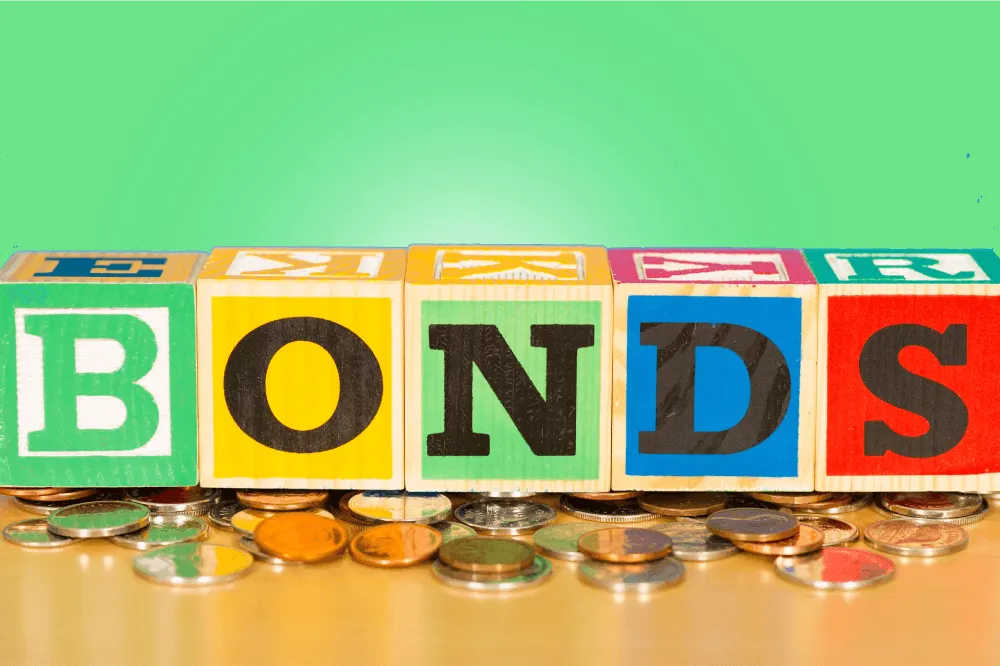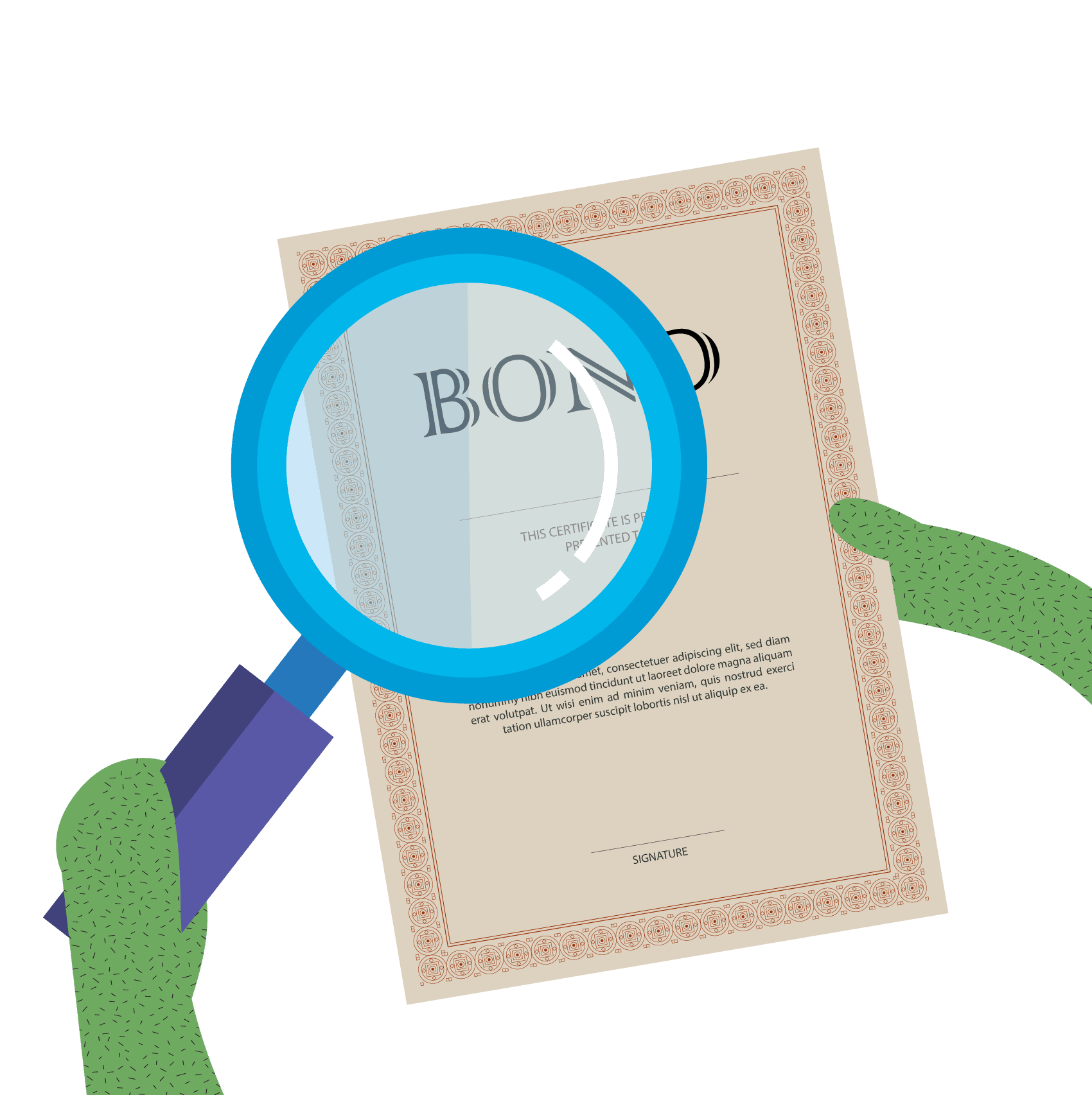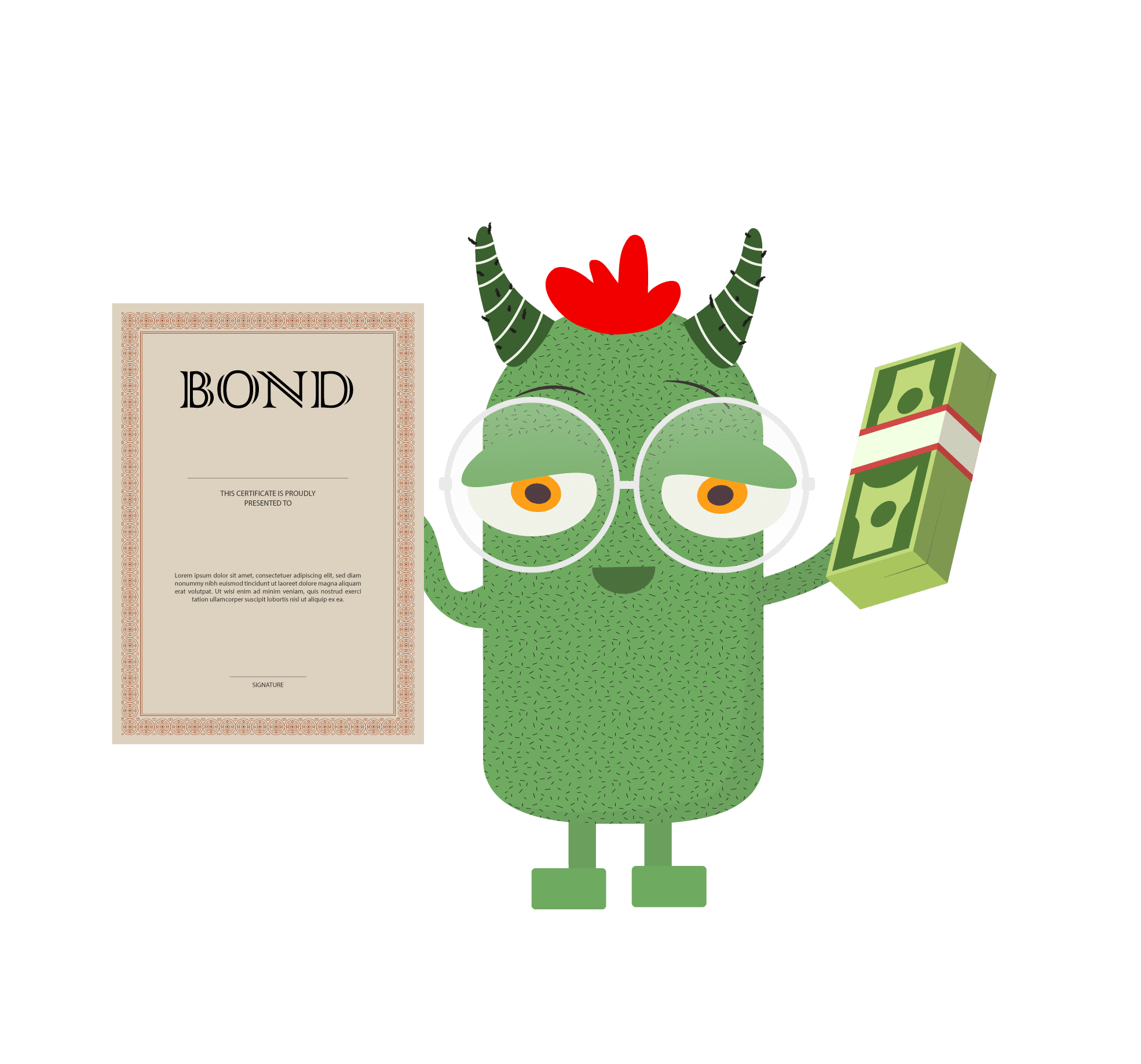Our partner, XM, lets you access a free demo account to apply your knowledge.
No hidden costs, no tricks.

Bonds are financial securities issued by governments or corporations for the exchange of cash flow. The bond issuer uses the allocated cash to fund different projects or for research and development reasons.
The bondholder pays the issuer the predetermined face value of the bond and receives interest payments until the bond term expires. The difference between bonds and stocks is that the bondholder does not own any shares in the issuing company and that all the conditions of the bond are defined beforehand.
There is a wide range of bond types and specifications that give more options for bond investors, which requires the trader to carefully analyze and study the bonds they wish to invest in. Therefore, we are going to explain in detail what bonds are, and how they work in the financial market.
"Gentlemen prefer bonds." - Andrew Mellon

A bond is a financial asset that is bought by investors and held until the term of the bond expires. When the bond expires, it returns to the issuer, and the investor gets their money back in addition to an interest rate paid periodically during the activity period of the bond.
Bonds are mainly issued by governments or corporations that seek to raise funds for different projects, purchase new equipment, or just grow the business. Bonds are issued at a bond face value that is paid by the investor to acquire this bond.
Bonds include an interest rate that is paid to the investor periodically. For example, if an investor buys a bond that will mature in 10 years, has a face value of $1,000, and at an interest rate of 10%, the investor pays $1,000 and receives $100 every year for 10 years. Once the bond matures after 10 years it returns to the issuer, who pays the face value of $1,000 back to the investor.
What distinguishes bonds from other financial instruments is that the terms and conditions are written on the bond beforehand. It is a kind of fixed security for the investor. However, it does not mean that it is totally risk-free.
The risk in trading bonds is represented in the interest rate. Since most bonds come with a fixed interest rate or coupon, if the economic situation changes and interest rates drop, the bond becomes expensive because the issuer is paying higher rates than the market interest rates.
"When growth is slower-than-expected, stocks go down. When inflation is higher-than-expected, bonds go down. When inflation is lower-than-expected, bonds go up." - Ray Dalio
When an entity wants to raise some funds, it may issue bonds either privately to investors, through (OTC) over-the-counter brokers, or in open financial markets where thousands of other financial instruments are traded.
The majority of bonds are not traded in an open market, or in a public exchange market similar to stocks or commodities. Bond trading usually takes place in OTC or privately between the lender and the borrower. The only exception is US treasury bonds that are traded publicly in the financial markets.
When bonds are traded in the financial markets, their prices fluctuate according to the supply and demand patterns of the market. When a bond is in high demand, its face value is more likely to increase.
Volatility with bonds is usually less than with stocks or Forex, as there are fewer traders involved in this market. However, this might create a liquidity problem on some occasions.
The interest rate or the coupon rate of the bond determines the price of the bond, and factors such as inflation and economic changes in the country may impact the value of the bond.
If a company issues bonds at a fixed coupon rate of 8%, and after 3 years the national bank decreases the general interest rate to 4%, it means the bond has become expensive, and the issuer is paying the holder more money than they would if they released bonds now.
On the other hand, the above example is a winning situation for the investor who is receiving higher interest returns. It is unlikely for the issuer to keep operating under such market conditions, and if the bond specifications allow them, they may re-buy the bond from the investor.

As we have already mentioned, what distinguishes the bond is that all the specifications and conditions are written on the bond beforehand, leaving little to no room for speculation. The characteristics of a bond differ from any other financial instrument, therefore it is important to know the following terms:
Bonds are different from any other financial instruments. There are different types of bonds that give the issuer different levels of authority and can work to help investors minimize their investment risks.
The different types of bonds include:
As the name suggests, this type of bond does not include a coupon or interest payments for the bondholder. Zero-coupon bonds are usually traded at a discounted price, and the bondholders only earn their profits at the maturity date when the issuer pays the full face value.
For example, let's say that a bond has a par value of $1,000. If it’s a zero-coupon bond it will be sold at a large discount, say $750, and the remaining $250 is paid back along with the initial price at the maturity date. This way the bondholder will receive the full face value of $1,000 in the end, while only paying $750 at the outset.
Bonds that are callable enable the issuer to recall the bond from the bondholders before maturity. This option works better for the bond issuers, as if there is a need, they can call back the bonds after issuing them to investors.
An issuer may call the bond back under some circumstances. For example, if the economic situation in the country changes and the interest rates drop, the bond becomes more expensive because the issuer is paying more interest than they would pay for a newly issued bond.
Moreover, if a company improves its creditworthiness during the bond lifetime, it may wish to call the bond back, because the company can now take loans at a lower interest rate.
Callable bonds are usually riskier for investors than usual bonds. Because of that, they are priced differently to accommodate this extra risk.
These bonds work the opposite way to callable bonds. The bondholder can return the puttable bond to the issuer before the maturity date. This option works better for the security of the investor.
A bondholder may put or give the bond back due to economic changes. After acquiring the bond, for instance, if the general interest rates in the country increase, the investor is basically missing the chance to earn a higher return, and is bound to lower returns from the bond they currently own. In such cases, the bondholder might choose to put the bond.
For example, an investor acquires a bond with a coupon rate of 8%. In the 5th year of the bonds' life, if the interest rates in the economy increase to 12%, the investor loses. In this case, the investor is losing the chance to buy a new bond that pays a higher coupon rate, thus making it useful to return the bond and seek out a better investment opportunity.
A convertible bond is one that can be exchanged for shares in the company, depending on the share price and the coupon rate.
A company may issue convertible bonds if they want to raise some funds and pay lower coupon rates to investors. It might be better for a company to release convertible bonds with a 6% coupon rate than to issue regular bonds with a 10% coupon rate.
On the other hand, these types of bonds can work better for the investor. If an investor sees a high potential for that company to grow, they might be interested in owning shares in the company and so might be getting higher returns from stock trading.

Bonds are financial instruments that are traded by investors to make money. Despite some differences from other assets, bonds can be traded publicly where millions of investors are buying and selling bonds, causing the prices to fluctuate.
Bond pricing is based on some elements, such as the creditworthiness of the issuer and the maturity date. Taking these conditions into account, rating agencies determine the price of the bond.
If a company has a good credit history, then the risks associated with the bonds they issue are lower, therefore the coupon rate can be low. On the other hand, if a company has a bad credit rating, the bondholder is incurring higher risks and expects to be paid a higher coupon rate.
Traders can make money in bonds either by holding the bond until the maturity date or reselling the bond, which we will discuss in further detail.
When an investor buys bonds, they can earn a profit by selling the bond again to another investor. Traders can resell the bonds in the open market, where a huge number of inventors are buying and selling bonds, causing the prices to fluctuate.
However, a bondholder who wishes to resell the bond needs to take into consideration the maturity date. For example, if the original bond has 10 years' maturity, they will need to resell in the open market with a maturity of fewer than 10 years.
It is basically holding the bond until it matures, and receiving the full face value of the bond, in addition to coupon payments during the lifetime of the bond.
Let’s say an investor wants to buy a bond with 10 years of maturity and a 5% coupon rate at a par value (face value) of $1,000. The investor will pay the discounted price of $950, and receive $50 annually for 10 years, and when the bond matures, the investor will receive the face value in full, which in this case is $1,000.
Holding the bond until maturity can be a better idea if the investor is anticipating low inflation rates in the coming years. This way, the bond will pay higher interest rates than any other security, unless the bond is called back by the issuer.
Similar to other tradable assets, you need to find a financial broker in order to buy and sell bonds. Only US Treasury bonds are sold publicly in the open market, while corporate bonds are sold privately or through over-the-counter brokers.
You need to find a reliable bond trading broker. It is not recommended to deal with any broker that does not hold any financial trading license, such as CySEC, FCA, FSCA, and ASIC, which are top authorities that observe the conduct of financial businesses and hold them accountable for their actions.
Then, depending on the bond you are interested in, you may check if it is included in the broker’s offering. This can be an important liquidity factor, if the broker has only a few bonds on offer, it might take more time to finalize the bond trading process.
While with brokers that offer several bonds, including publicly traded bonds, it can be a positive sign that transactions are done at a faster pace, and you will not face any slippage time.
Bonds can be a safe security for investors, as the speculations are lower than in other financial markets. However, just as any financial security, bond trading has its benefits and downsides.
Our partner, XM, lets you access a free demo account to apply your knowledge.
No hidden costs, no tricks.
Bonds are financial securities that are traded for cash. Governments or corporations may release bonds to investors in exchange for cash. The bonds have a maturity date when the bond expires and returns to the issuer, and the issuer pays back the face value to the investor.
Bonds are less risky than stocks, they have less volatility and provide a fixed stream of income for the bondholder. While the stock can result in higher gains, there are more volatile, and the stock price can drop dramatically. Therefore, it highly depends on the trader’s experience, expectations, and trading style, whether they look for short or long-term gains, or if they want risky or less risky securities.
Bonds are generally safer than most financial instruments. However, you can lose money in bonds if the inflation rates in the country go high and beyond the value of the money you receive from coupon payments. Additionally, if the company that issued the bond defaults, you are going to lose the money that you paid for it.
Investors make money from bonds either by holding the bond until maturity or by re-selling the bond to other traders. When you hold the bond until maturity, you can receive coupon payments during the lifetime of the bond, and receive the full face value back at its maturity date. However, if you resell the bond to another trader, you earn the price difference. If you choose to sell the bond, you ideally sell the bond at a higher price than what you’ve paid to acquire the bond and so make a profit.
It depends on the economic cycle. Bonds are highly associated with local inflation and interest rates. If the economy is performing well, it can be a good time to invest in bonds. Because then, it is more likely for the inflation rate to stabilize, and for the interest rate to drop. Therefore, the value of the money you receive from the coupon payment will not depreciate, also you will benefit from the coupon rate if the national interest rate drops below the bond coupon rate.